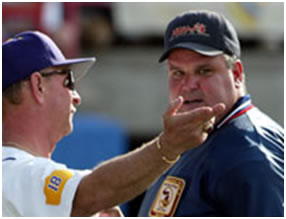| Improving the Relationship Between Coach and
Originally published in NFHS Coaching Today www.nfhslearn.com/
In the early 1900s, Hall of Fame pitcher Christy Mathewson said that an umpire is "sort of a necessary evil to the luxury of baseball, like the odor that follows an automobile." Not much has changed in the century that has passed since Old Christy made that observation. Cars are cleaner now, but the umpire/coach relationship is still charged with emotion, tempered by the two parties' mutual love of baseball and the overriding reality that without each other, the game literally cannot go on. Since divorce is not an option, this baseball marriage needs the delicate touch of a counselor once in awhile to identify behavioral problem areas so each party can find a way to move forward and annoy each other a little less. It could be said that umpires are from Mars and coaches are from Venus; they just fire on different cylinders. How can the relationship be improved? For a start, umpires should try to understand what a high school coach goes through during a day, week or month of a season. Since officiating is an avocation, a full-time coach will spend more time running a program (raising money, dealing with parents and kids, and even performing field maintenance) than an umpire will spend working on being an umpire. Umpires need to know and respect that fact. Coaches need to know that umpires really do not care who wins the game they are working. The coaches care, the kids care and the fans care, but the umpires truly do not care. The umpires do care about running a solid and efficient game, getting everything possible correct and being a good partner to their fellow umpires. Umpires need to know that coaches have put their professional success in the hands of teenagers who may be thinking more about the prom that night than their game that day. This makes the coaches cranky, and the umpire is often the nearest "whipping post" for their frustrations. Each side usually succeeds in aggravating the other side with mannerisms, gestures and/or annoying chatter, some of it probably deliberate and all of it designed to gain some supposed advantage over the target. This interplay often begins with the home plate meeting, and no one is really guaranteed to be in the best of moods. The home coach has already been on-site for three hours and he's worried about his team's focus, a broken sprinkler head and a pitcher's tight elbow. The visiting coach team's bus was late picking his team up, and he has issues with a couple of overzealous parents. The umpires are ticked off because they had to get dressed in the parking lot in full view of some nosy fans. If there is "history" between the teams or past conflict between coaches or with the umpiring crew, then even the simple home plate meeting is fraught with danger. The coaches would really prefer to keep "chit/chat" to a minimum and put on their game face, so the umpiring crew should be friendly without giving off the impression that they aren't as focused as the coaches and teams. At this point the coaches are praying that their pitcher throws strikes, that the umpire won't "squeeze" the strike zone and that his shortstop won't make three errors today like he did a couple of days before. Both coaches want strikes called and an ump with a "postage stamp" strike zone will cause the blood pressure to rise. The best way to say it might be, "it is a strike until it proves itself a ball and if the ump isn't sure, call it a strike." One or both coaches will have cause to discuss a close play with the umpiring crew and the umpires axiom, "be the calmest man in the conversation" will usually serve "Old Blue" well as the coaches try and figure out a way to try and set up the next close call for their team. Only in their dreams can umpires turn the tables on coaches. What umpire with any mileage on him wouldn't love to berate a coach who gets a runner thrown out at home plate, "How could you have waved him home? Everybody here but you could see that he was going to get thrown. Pull your head out." Then with arms flailing and gesturing to the crowd, the umpire stomps back to his position, wakes up from his dream to realize that he is the one getting castigated by the coach and the crowd for making a call that he was obviously correct in making. When the game ends, umpires should complete the act of staying invisible and depart the field quickly via a pre-planned route that avoids the coaches, players and fans, all of whom at one point or another during the game thought that the umpires were "brutal." Walk quickly, don't run and save any laughter over "stupid things coaches say" for a quiet, out-of-the-way place. In high school baseball the best piece of advice might go like this, "mom and dad do not come to watch you coach or the umpires umpire. They come to watch the kids play the game. Umpires and coaches should be out of sight and out of mind as much as possible!" ABOUT THE AUTHOR: Chris Healy is the commissioner of baseball officials for the Northern Nevada Officials Association. |




 The relationship between baseball coaches and umpires, much like a successful marriage, is built upon the ability to forgive, forget and move on to the next confrontation. It is truly one of the strangest relationships in all of sports.
The relationship between baseball coaches and umpires, much like a successful marriage, is built upon the ability to forgive, forget and move on to the next confrontation. It is truly one of the strangest relationships in all of sports.